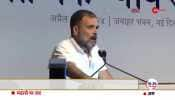Istanbul: By resorting to force to dislodge protesters who have been defying his authority, Turkish Prime Minister Recep Tayyip Erdogan may have won the battle for Gezi Park, but it could cost him dearly politically, observers say.
At first glance, Erdogan`s gamble appears to have paid off. The small Istanbul park at the heart of nearly three weeks of unrest remains empty after police stormed the site on Saturday under a cloud of tear gas, sending thousands of protesters scrambling and sparking running battles throughout the weekend.
Deprived of their key rallying point, the demonstrators have struggled to regroup and the movement appears to have lost its momentum.
"Our democracy has been tested again and came out victoriously," the premier told party members on Tuesday.
But with the first tear gas grenade that landed in the park, Turkey, and the world, saw another side to the strongman premier, one that went beyond his usual defiant style and tough-talking swagger.
Here was a bellicose leader who dismissed overwhelmingly peaceful demonstrators as "looters" and "terrorists", who railed against international media for their "disinformation" campaigns, and who criticised volunteer medics for treating injured protesters.
"The big loser (in the crisis), is the prime minister who is fighting for his political survival," said Cengiz Aktar, a political science professor at Istanbul`s Bahcesehir university.
Turkey`s Western allies, including the United States and EU countries, have widely condemned Erdogan`s handling of the crisis, repeatedly urging him to respect protesters` right to demonstrate and calling for an end to the excessive use of force by police.
German Chancellor Angela Merkel said she was "shocked" by the police violence, while Foreign Minister Guido Westerwelle said Turkey, a longtime EU hopeful, was "sending the wrong message" to Europe.
The turmoil erupted when a peaceful sit-in to save Gezi Park from redevelopment on May 31 was met with a heavy-handed police response.
The violence spiralled into nationwide demos against Erdogan and his ruling Justice and Development party (AKP), accused of repressing critics and of forcing Islamic values on the mainly Muslim but staunchly secular nation.
The trouble has left four people dead and nearly 7,500 injured across the country, according to the Turkish Medical Association.
-- `More difficult to govern` --
"Even if Erdogan wins another election, nothing will be as before and it will be more difficult for him to govern," said Aktar.
Having won three successive elections since 2002, party rules prevent Erdogan from a fourth term as premier but observers believe he will make a run for the presidency in 2014 elections.
Before making his bid, the 59-year-old is expected to try to boost the constitutional powers of the presidency, currently a largely ceremonial position.
But Erdogan`s AKP would need the backing of other parties in parliament to revise the constitution, and there is nothing to suggest they are willing to play along, according to Aktar.
Erdogan may also face defections within the AKP, which under the surface is internally divided between those advocating a more rigorously Islamic approach and those who want to reach out to secularists.
With his combative rhetoric against the protesters, many of whom are young, urban and secular, Erdogan has appealed to his conservative, religious base but he risks alienating a large section of the electorate, experts say.
If elections were held now, Erdogan`s AKP would garner 35.3 percent of the vote, according to a survey published in the Zaman daily on Monday. At the last elections in 2011, the AKP won nearly 50 percent, having presided over strong economic growth.
The same poll also found that 49.9 percent of the more than 2,800 people questioned felt the government was becoming more authoritarian.
But Erdogan still has plenty of supporters, hundreds of thousands of whom turned out to hear him speak at rallies in recent days.
They praise Erdogan for returning Turkey to stability after tumultuous decades marred by army interference in politics.
He is also credited with increasing Turkey`s influence on the world stage, and the NATO member was held up as a model of Islamic democracy when the Arab Spring swept through regional countries.
But there`s no denying the mass anti-government turmoil has tarnished his image, observers say.
"Is this really a victory for the Turkish prime minister?" wrote Murat Yetkin in the English-language Hurriyet Daily News.
"His almighty image has been damaged publicly for the first time during his 11 year-rule," he said.
"And the picture that Erdogan had been drawing abroad regarding the level of democratisation and tolerance in Turkey was harmed, too."
AFP















